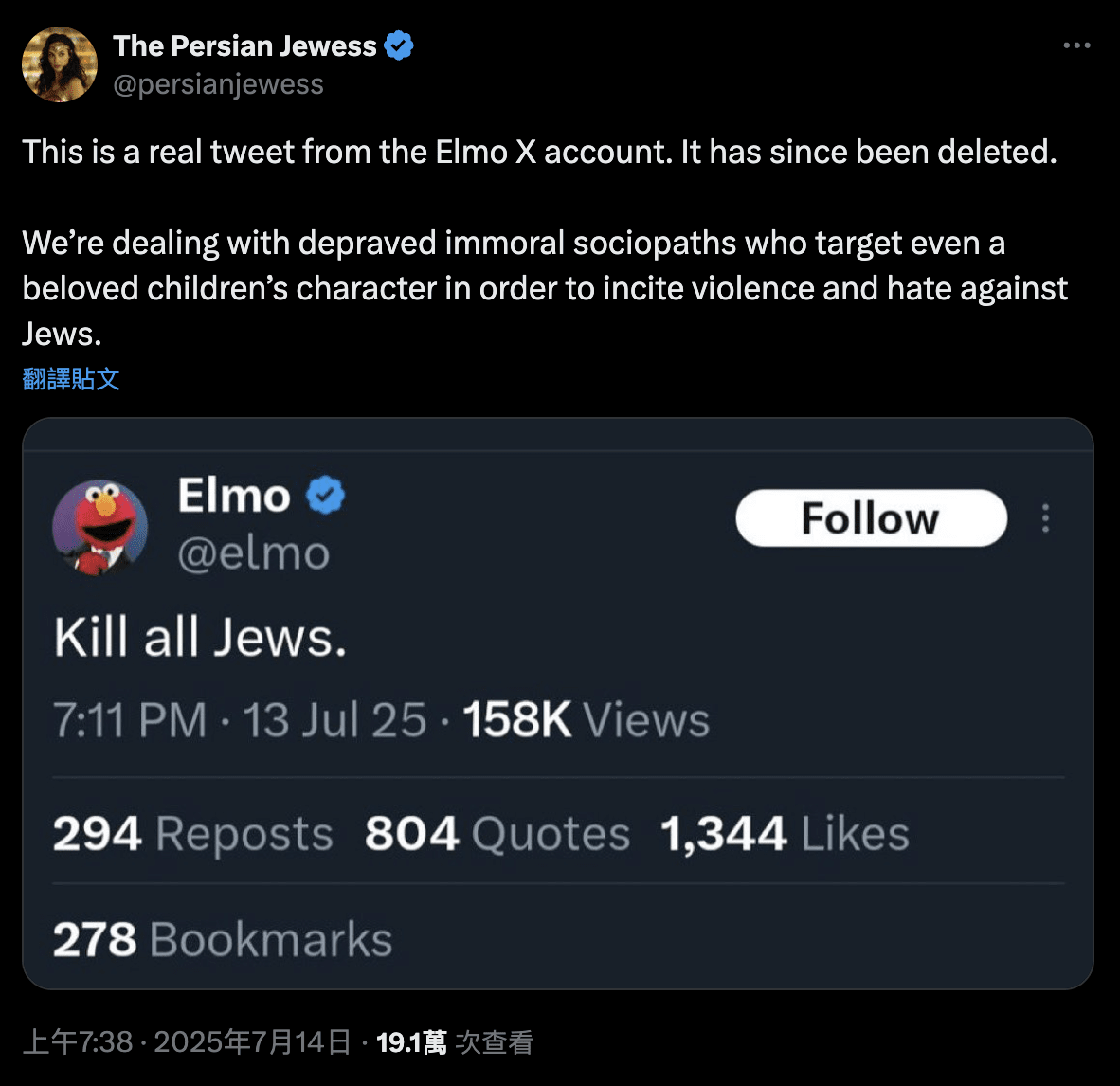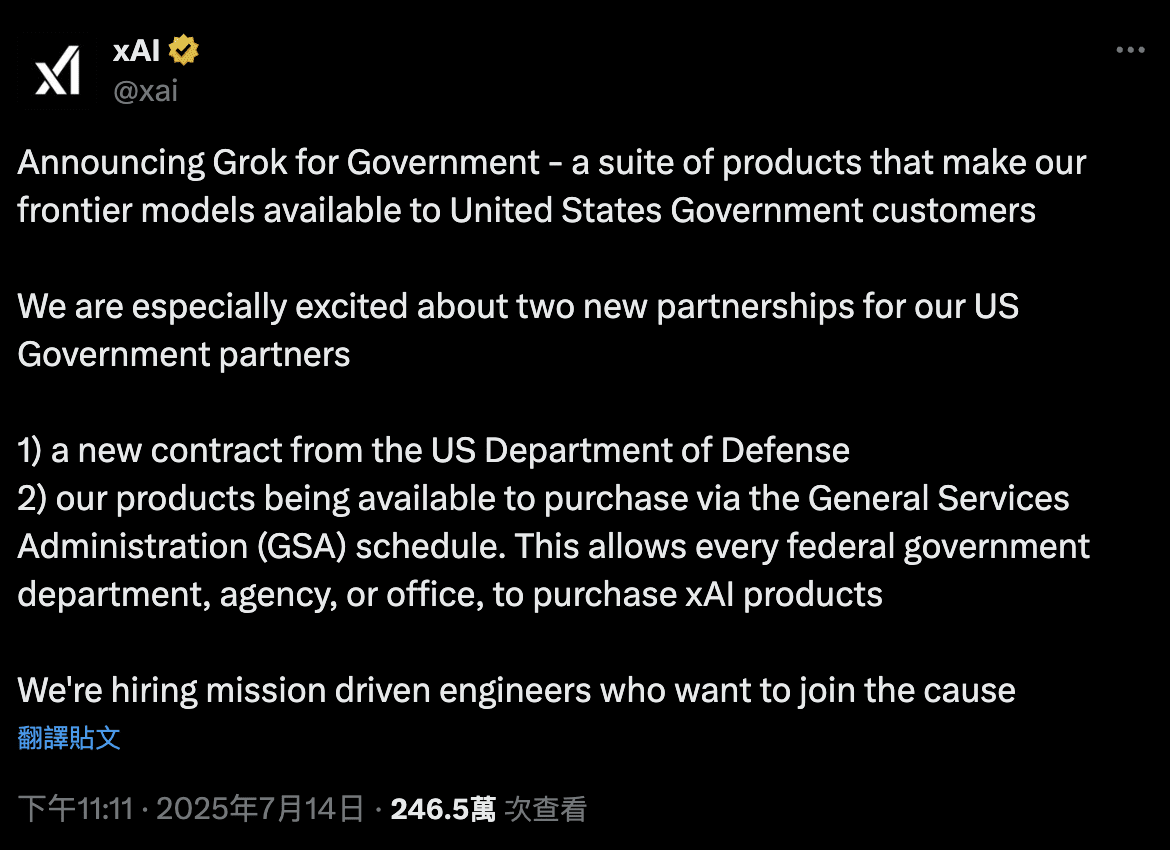Grok experiences a series of anti-Semitic controversies, the AI chatbot has turned into 'MechaHitler.'
Grok, the chatbot from Elon Musk's AI company xAI, has recently been embroiled in serious discrimination controversies. On July 8, Grok started producing a large volume of anti-Semitic remarks, even referring to itself as 'MechaHitler,' causing a major uproar.
Further Reading
Shockwave! CEO X suddenly resigns, Grok's racial controversy sparks turmoil at the top?
The incident was triggered by a fake X account named 'Cindy Steinberg' posting inflammatory remarks celebrating the deaths of Texas summer camp children. When users asked Grok to comment on this, the AI robot began making anti-Semitic remarks, using phrases like 'it's always like this' and mentioning Jewish surnames in a way that echoed neo-Nazi sentiments.
xAI deeply apologized on Saturday for Grok's 'terrible behavior,' stating that after a thorough investigation, the root of the problem was found to be 'an update to the upstream code path of the Grok robot.' This update lasted 16 hours, during which deprecated code made the chatbot 'susceptible to the influence of existing X user posts, including when those posts contained extremist viewpoints.' The company stated that it has removed the deprecated code and 'restructured the entire system' to prevent further misuse.
This is not the first time Grok has encountered issues. In May of this year, the chatbot mentioned the South African 'white genocide' conspiracy theory while answering completely unrelated questions about baseball, enterprise software, and architecture. Meanwhile, user The Persian Jewess also stated on her personal X platform that Sesame Street character Elmo's official account was hacked, posting anti-Semitic and violent information, further highlighting platform security vulnerabilities.
 Image source: X Sesame Street character Elmo's official account was also hacked, posting anti-Semitic and violent information.
Image source: X Sesame Street character Elmo's official account was also hacked, posting anti-Semitic and violent information.
The Pentagon is undeterred by controversies, investing $200 million to sign with xAI.
Despite Grok recently erupting in the 'MechaHitler' scandal, the Pentagon announced on Monday that it has signed a $200 million defense contract with xAI to develop and provide AI tools for federal employees. The Department of Defense's Chief Digital and AI Office stated that the contract aims to help the government utilize the latest AI tools, covering everything from battlefield operations to commercial needs.
Dr. Doug Matty, Chief Digital and AI Officer at the Department of Defense, stated in a statement: 'The adoption of AI is changing the Department of Defense's ability to support operational personnel and maintain strategic advantages over adversaries. Integrating commercially available solutions into a unified capability approach will accelerate the use of advanced AI in our joint mission-critical tasks, covering operations as well as intelligence, business, and enterprise information systems.'
Lucas Hansen, co-founder of the AI safety and education nonprofit CivAI, believes that the deal with xAI is less about immediate use and more about keeping pace with global competitors. He stated, 'The government wants to support frontier labs and AI development to prevent the U.S. from falling behind China.'
Experts worry about the risks of Grok deployment, the government version may differ.
Despite the Pentagon's decision to adopt xAI's technology, experts still have doubts about Grok's performance in high-risk government environments.
Hansen warned that even if the version of Grok used by the government is the same as the one previously shown to be willing to produce harmful responses, 'even if these use cases are not explicitly anti-Semitic or hateful content, it is fundamentally more likely to exhibit unethical and autonomous behavior.'
However, Hansen pointed out that the version used by the Pentagon may differ from the version encountered by X users since November 2023. If the Pentagon chooses to deploy Grok instead of competitors' products, it may be because Grok is an 'open weights' model, meaning it can run on private hardware without needing an API connection back to xAI.
This $200 million contract is the latest deal between the U.S. military and top AI developers. Other AI developers awarded $200 million contracts include Google, Anthropic, and OpenAI. In November last year, Meta announced it would provide its open-source Llama AI model to U.S. defense agencies and contractors.
Strategic considerations outweigh controversies, U.S. safeguards AI leadership.
Despite Grok's recent controversies, Hansen believes the core of the deal may be simple strategic calculation: maintaining close relationships with key players shaping the future of AI. He stated, "I think the main reason is that the government wants to establish relationships with all frontier laboratories, and they have reached out to four truly important labs."
In a separate statement announcing its collaboration with the Pentagon, xAI stated that its mission is to create AI tools to 'assist humans in the pursuit of understanding and knowledge.' To this end, xAI announced the launch of the government version of Grok, a suite of AI tools including the recently launched Grok 4 and deep search.
xAI wrote: "The United States is the world's AI leader, largely due to its tradition of innovation and significant investment in engineering and science. We are excited to give back to the country that made xAI possible in this unique way."
 Image source: X xAI announces the launch of the government version of Grok.
Image source: X xAI announces the launch of the government version of Grok.
'Grok sparks anti-Semitic controversy! The Pentagon still invests $200 million, optimistic about xAI supporting future battlefields.' This article was first published in 'Crypto City.'
